WHO supports health referrals in northeast Syria
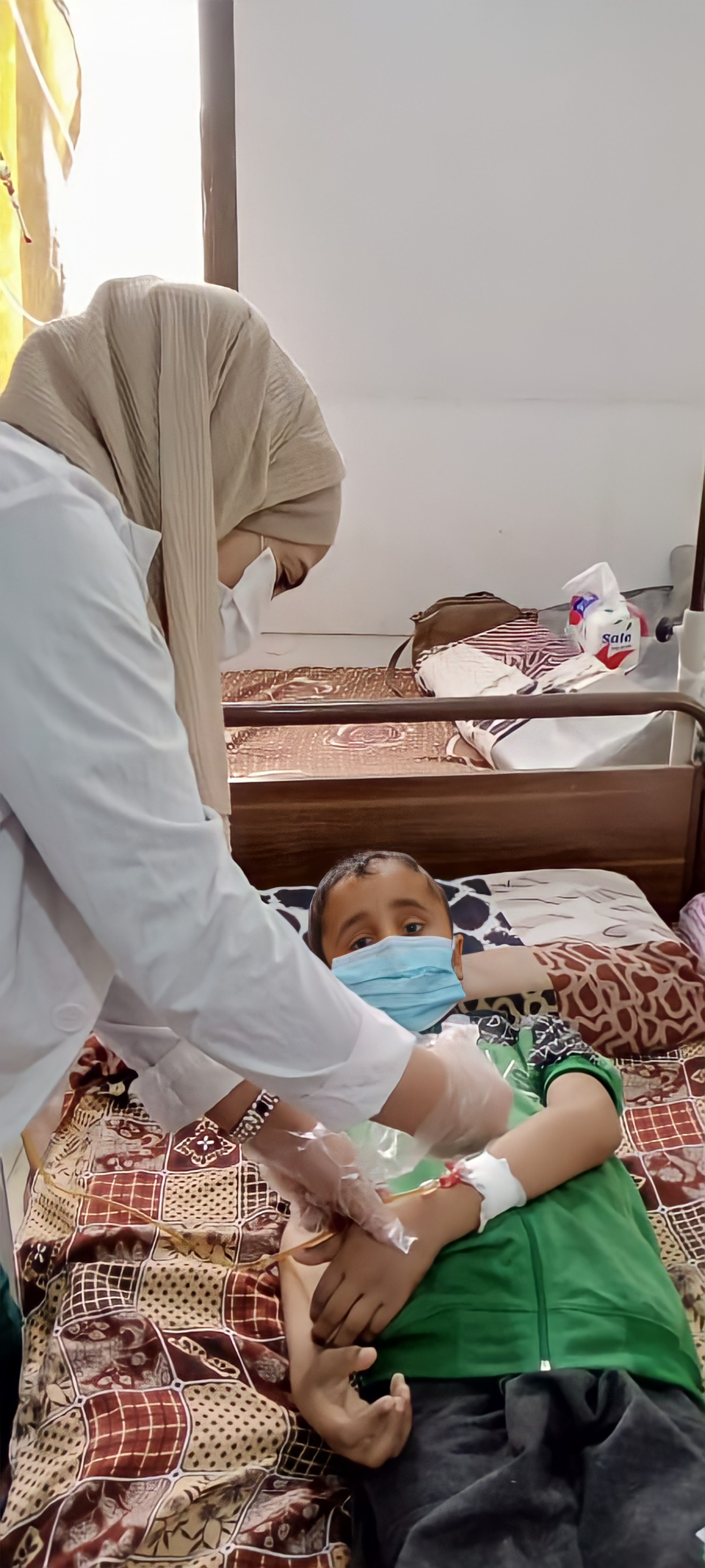 Saber, a 9-year-old boy from Deir-ez-Zor governorate is the only son of a vulnerable family that was forced to leave its village in search of security and shelter.Damascus, 6 October 2022 – The need for humanitarian aid in northeast Syria is constantly growing due to ongoing hostilities that continue to claim fatalities every day, as well as severe water shortages impacting health and livelihoods and exacerbating people’s suffering. In addition to treating children with malnutrition in northeast Syria, monitoring the quality of drinking-water, covering the operational costs of COVID-19 vaccination campaigns and the Essential Programme on Immunization activities, the continuous provision of medicines, equipment, personal protective equipment for health care workers, consumables, and medical supplies – through both crosslines deliveries, road and air shipments – WHO’s humanitarian health response in northeast Syria also includes supporting the referral health system.
Saber, a 9-year-old boy from Deir-ez-Zor governorate is the only son of a vulnerable family that was forced to leave its village in search of security and shelter.Damascus, 6 October 2022 – The need for humanitarian aid in northeast Syria is constantly growing due to ongoing hostilities that continue to claim fatalities every day, as well as severe water shortages impacting health and livelihoods and exacerbating people’s suffering. In addition to treating children with malnutrition in northeast Syria, monitoring the quality of drinking-water, covering the operational costs of COVID-19 vaccination campaigns and the Essential Programme on Immunization activities, the continuous provision of medicines, equipment, personal protective equipment for health care workers, consumables, and medical supplies – through both crosslines deliveries, road and air shipments – WHO’s humanitarian health response in northeast Syria also includes supporting the referral health system.
Saber, a 9-year-old boy from Deir-ez-Zor governorate is the only son of a vulnerable family that was forced to leave its village in search of security and shelter. The family was displaced multiple times until it ended up in the Areesha camp in northeast Syria. “We used to live in a tattered tent under harsh weather conditions. We walked through the desert in the heat with no food for days on end. We experienced a lot of pain, hunger, fear, and displacement until we finally settled in the Areesha camp,” Saber’s mother recounted. “A few months after Saber’s birth, he had been diagnosed with a brain cyst requiring surgery – an expensive procedure which we couldn’t afford,” the mother added.
In the camp, the child’s health deteriorated a little more each day. He began suffering vision impairments and severe headaches. Following examination by a mobile medical team, the child was referred to the WHO-supported Al-Hikmeh Hospital in Al-Hassakeh where he was admitted and started his treatment journey. Saber underwent surgery and received the needed medical interventions; his health improved gradually until he was discharged from the hospital, fully recovered.
As per 2022 estimates, more than 2.7 million people in the 3 governorates of northeast Syria require humanitarian assistance, including approximately 697 106 internally displaced persons and refugees who represent 90% of the referrals received and treated through the 55-bed Al-Hikmeh Hospital.
“Health needs across northeast Syria remain dire. The functionality of health facilities and availability of health human resources remain critically lacking with health systems unable to respond to the increasing needs and gaps,” said Dr Iman Shankiti, WHO Representative in Syria. “WHO is working with all partners to address wider health needs and to ensure that essential health services remain available in northeast Syria,” she added.
In 2021, thanks to kind donations from Australia, the Foreign, Commonwealth and Development Office (FCDO), Norway, and the Office of U.S. Foreign Disaster Assistance (OFDA), WHO’s agreement with Al-Hikmeh Hospital enabled the provision of trauma, secondary, and emergency care services to 8774 referred patients –mostly women and children – of whom 2356 were from the Areesha camp.
Based on the latest data of the Health Resources and Services Availability Monitoring System (HeRAMS), out of 16 public hospitals in northeast Syria, only one is fully functional, 8 are partially functional, and 7 are not functional, while only 2 districts meet the emergency threshold of at least 22 health care workers per 10 000 population, making the lack of health human resources a chronic challenge.
Norway lends first-hand support to WHO in response to the cholera outbreak in Syria
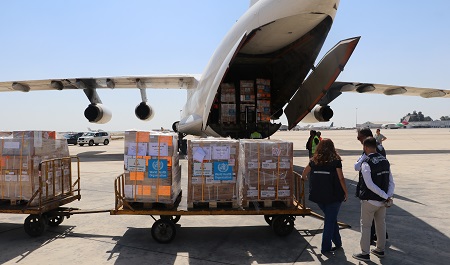 Responding to the cholera outbreak in Syria, WHO delivered a 60-tonne shipment of cholera kits, oral rehydration solutions, rapid diagnostic tests, and medical supplies for intravenous (IV) rehydration treatment, in addition to chlorine for water purification4 October 2022, Damascus – Funding from Norway has enabled WHO to immediately respond to the cholera outbreak declared by the Syrian Ministry of Health on 10 September 2022 and ensure the delivery of supplies for thousands of people who are infected or at risk.
Responding to the cholera outbreak in Syria, WHO delivered a 60-tonne shipment of cholera kits, oral rehydration solutions, rapid diagnostic tests, and medical supplies for intravenous (IV) rehydration treatment, in addition to chlorine for water purification4 October 2022, Damascus – Funding from Norway has enabled WHO to immediately respond to the cholera outbreak declared by the Syrian Ministry of Health on 10 September 2022 and ensure the delivery of supplies for thousands of people who are infected or at risk.
“Syria’s health system has been repeatedly strained through multiple concurrent emergencies and challenges that continue to affect the availability and quality of health services across the country. More than half of the health facilities in Syria remain partially functional or destroyed,” said Dr Iman Shankiti, WHO Representative in Syria. “This support from Norway is a critical contribution to WHO's work and plays a key role in strengthening our response to the current outbreak while addressing wider health needs,” Dr Shankiti added.
Using flexible funds from Norway that allow WHO to meet the urgent needs as they arise, WHO was able to procure the needed life-saving treatments from the local market in the first days of the cholera outbreak and deliver a 60-tonne shipment of cholera kits, oral rehydration solutions, rapid diagnostic tests, and medical supplies for intravenous (IV) rehydration treatment, in addition to chlorine for water purification.
The shipments, airlifted from WHO’s logistics hub in Dubai, will enable health authorities and partners to provide treatment for 2000 severe cholera cases and almost 190 000 cases of diarrhoea with mild symptoms. In Aleppo governorate, WHO distributed more than 250 000 chlorine tablets, and trained around 100 health care workers on surveillance, infection, prevention and control measures, as well as case management. WHO is also working on expanding the capacity of cholera treatment units by delivering 30 patient beds and needed accessories.
After a decade of zero cholera cases in Syria, on 1 October 2022, the Ministry of Health reported a cholera outbreak in 11 governorates (Aleppo, Hassakeh, Deir Ez-Zor, Ar-Raqqa-Latakia, Homs, Hama, As-Sweida, Daraa, Qunitera, and Damascus) with a total of 36 deaths and 524 confirmed cases.
The situation is evolving alarmingly in affected governorates and expanding to new areas. WHO is following up closely with all health partners to contain the outbreak and prevent further spread of infection through enhancing cholera surveillance in high-risk areas at health facilities and community levels, promoting community awareness, including access to sanitation and personal hygiene practices, providing chlorination for drinking-water sources, securing rapid diagnostic tests, and providing needed treatments.
Norway has been a long-standing partner of WHO, continuously working to strengthen emergency response activities to meet the needs of the most vulnerable populations in Syria.
Update on COVID-19 vaccination in Syria, 22 August 2022
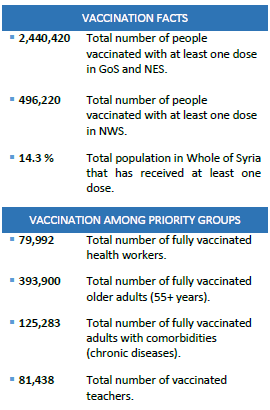 Summary
Summary
As of 22 August 2022, the total number of COVID-19 vaccines delivered to Syria through the COVAX Facility is 11 357 640 doses in addition to the 2 953 640 doses received through bilateral agreements. The available vaccines should enable Syria to reach more than 45% of its population.
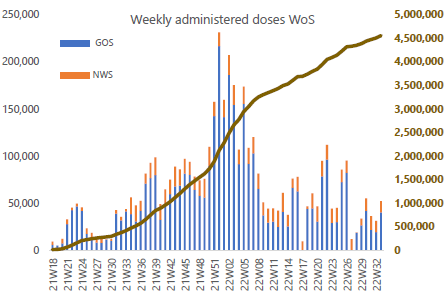
Trends in COVID-19 vaccination coverage at the Whole of Syria level
Within its relentless efforts to raise COVID-19 vaccination coverage in Syria, the Ministry of Health recently conducted 2 intensified national COVID-19 vaccination campaigns targeting all people above 18 years of age in all Syrian governorates, encouraging people to take their vaccines and get better protection.
The 2 rounds of the campaign reached 182 000 and 165 000 people, respectively. The intensified risk communication and community engagement activities, prior to and during the campaign, increased people’s access to vaccines and encouraged communities to protect themselves.
WHO cooperated with health directorates in the governorates of Damascus, Lattakia, Homs, Hama, and Aleppo to train more than 300 volunteers on communication skills to mitigate vaccine hesitancy and raise vaccine uptake. The volunteers included nongovernmental organizations, community initiatives, religious leaders, as well as health personnel from the Directorates of Health. During the 2 campaigns, volunteers worked in parallel with vaccination teams to address fears, combat rumours and deliver adequate messages.
Challenges

WHO and UDER implement multi-partner project to boost primary health care services in northwest Syria
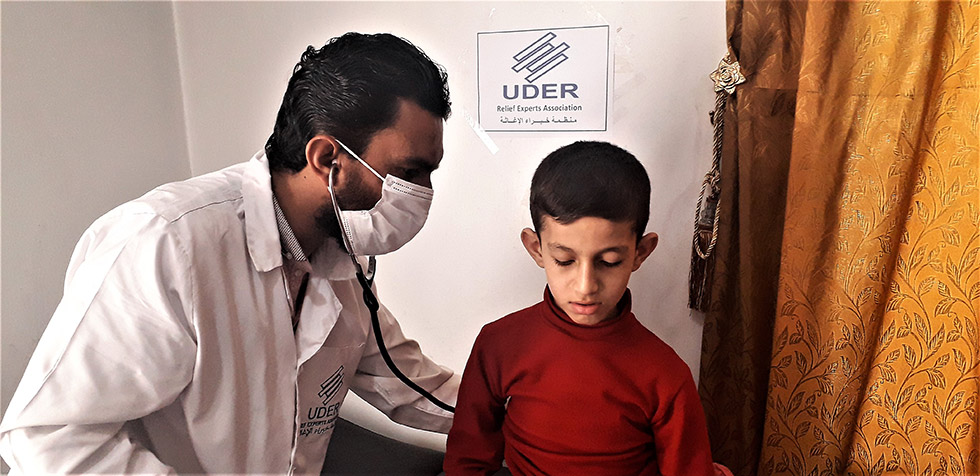
16 August 2022 – WHO, together with the Relief Experts Association UDER as implementing agency, has bolstered the provision of primary health care services in northwest Syria by rendering the facilities in the towns of Sarmada, Tarmanin, Daret Azza and Zarzour fully operational.
Due to the size and scope of the project – which took place between August 2021 and May 2022 – UDER had struck agreements with several other organizations on the ground. Thanks to immense efforts requiring daily coordination, the Mentor Initiative offered leishmaniasis treatment services; Physicians Across Continents delivered malnutrition services; Shafak Organization provided childbirth and nutrition services; the Syrian Immunization Group made various vaccination services available – including for tuberculosis, polio, diphtheria, tetanus, pertussis, haemophilus influenzae type B, hepatitis B, measles, German measles, mumps and COVID-19; the Assistance Coordination Unit provided daily nutritional surveillance services; and the Qatar Red Crescent offered psychosocial services.
This multi-partner approach proved highly effective in delivering th best possible health care to the people of northwest Syria.
During the project – supported by the United Nations Office for the Coordination of Humanitarian Affairs (UNOCHA) and its Syrian Cross-border Humanitarian Fund (SCHF) – 174 374 medical consultations were provided through the 4 health facilities (132% of the targeted 131 893), including for 98 064 internally displaced persons in the area. A total of 127 276 patients (equating over 159% of the targeted 80 000) were screened for temperature measurements.
Over 70 health care workers (254% of the 28 originally targeted) were trained on various health topics. UDER also recruited 24 community health workers in connection to the 4 health care centres (10 in Sarmada; 6 in Tarmanin; 2 in Daret Azza; and 6 in Zarzour) to actively screen communities and refer individuals with health conditions to the facilities. The total number of people screened and referred to health services reached 4892 (230% of the planned target: 2125).
By the end of the project, community health workers had conducted 17 403 household sessions (103% of the targeted 16 896), which comprised health education and awareness, including on the preventative measures against COVID-19.
For more information, please contact:
Grattan Lynch
Communications Officer
E-mail:


